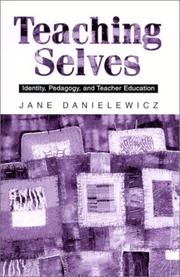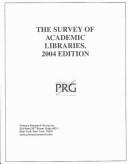| Listing 1 - 10 of 242 | << page >> |
Sort by
|

ISBN: 0791450031 079145004X 9780791450031 0791490475 9780791490471 Year: 2001 Publisher: Albany State University of New York Press
Abstract | Keywords | Export | Availability | Bookmark
 Loading...
Loading...Choose an application
- Reference Manager
- EndNote
- RefWorks (Direct export to RefWorks)
College students --- Teachers --- Lerarenopleiding --- Training of --- algemeen. --- College life --- Universities and colleges --- University students --- Students --- Education

ISBN: 1574400673 1574409913 9781574400670 9781574403602 1574403605 Year: 2015 Publisher: New York, NY Primary Research Group, Inc.
Abstract | Keywords | Export | Availability | Bookmark
 Loading...
Loading...Choose an application
- Reference Manager
- EndNote
- RefWorks (Direct export to RefWorks)
College students --- College life --- Universities and colleges --- University students --- Students --- Mental health services. --- Education
Book
ISBN: 0674727037 067472609X 9780674726093 9780674049024 0674049020 9780674727038 Year: 2014 Publisher: Cambridge, MA
Abstract | Keywords | Export | Availability | Bookmark
 Loading...
Loading...Choose an application
- Reference Manager
- EndNote
- RefWorks (Direct export to RefWorks)
Constrained by shrinking budgets, can colleges do more to improve the quality of education? And can students get more out of college without paying higher tuition? Daniel Chambliss and Christopher Takacs conclude that limited resources need not diminish the undergraduate experience. How College Works reveals the decisive role that personal relationships play in determining a student's success, and puts forward a set of small, inexpensive interventions that yield substantial improvements in educational outcomes. At a liberal arts college in New York, the authors followed nearly one hundred students over eight years. The curricular and technological innovations beloved by administrators mattered much less than did professors and peers, especially early on. At every turning point in undergraduate lives, it was the people, not the programs, that proved critical. Great teachers were more important than the topics studied, and just two or three good friendships made a significant difference academically as well as socially. For most students, college works best when it provides the daily motivation to learn, not just access to information. Improving higher education means focusing on the quality of relationships with mentors and classmates, for when students form the right bonds, they make the most of their education.
College students. --- College life --- College students --- Universities and colleges --- University students --- Students --- Education
Book
ISBN: 1281187240 9786611187248 1605570702 1435628527 9781435628526 Year: 2006 Publisher: [Place of publication not identified] BookSurge
Abstract | Keywords | Export | Availability | Bookmark
 Loading...
Loading...Choose an application
- Reference Manager
- EndNote
- RefWorks (Direct export to RefWorks)
Katie Ledford unveils the mysteries and challenges of college life in her insightful book, Year by Year, The Real College Life. Chocked full of everything a college student needs to know, it takes the reader through each year of the college experience.
College students --- Students --- College life --- Universities and colleges --- University students --- Conduct of life. --- Education
Book
ISBN: 8021085150 9788021085152 9788021085145 Year: 2016 Publisher: Brno
Abstract | Keywords | Export | Availability | Bookmark
 Loading...
Loading...Choose an application
- Reference Manager
- EndNote
- RefWorks (Direct export to RefWorks)
The publication presents in detail the research results of 3 unique studies on substance drugs, addictive behavior of non-substance nature and prevention of addictions in samples of full-time students at the Masaryk University. Th e text consists of a brief introduction to the issue, describing the situation in matters relating to substance abuse and behavior in the world, in Europe, in the Czech Republic and in selected segments of the sample—among university students and among persons with disabilities. It is followed by a section devoted to methodology—characteristics of applied research tools, selection and monitored samples, evaluated indicators and processing of collected data. Th e section containing research data, their description and interpretation presents the results in text and table form. In the discussion, the outcomes are compared with similar surveys by Czech and foreign authors. Th e results of the fi rst study showed that more than three quarters of the sample have previously used tobacco, only one tenth legally, almost 40% of the respondents smoked in the last week before the survey. Previous prevalence of experience with alcohol was 99%, only 3% of the sample consumed alcoholic beverages legally, women drank more occasionally, men regularly. Almost three quarters of the respondents admitted having drunk alcohol in the last week before the survey. Black coff ee was previously drunk by 80% of the sample, women are its more regular consumers, half of the respondents drank black coff ee in the last week preceding the interview. Prevalence of previous experience with marijuana was 60%, 25% for hashish oil and hashish. Marijuana was consumed in the last month by 16% of the sample, signifi cantly more by men, 4% used hashish and hashish oil, again with a predominance of men. Prevalence of previous experience with hallucinogens was 13%, higher among men, consumed by 1% of the respondents in the last month, particularly by men, mostly involving magic mushrooms. Depressant medications without a prescription were tried by 8% of the sample, nearly 1% in the last month, always dominated by women. A tenth of the sample had previous experience with club drugs, used by approx. 1% in the past month, mostly males. At least one life experience with the so-called “hard” drugs was reported by fewer than 5% of the respondents, mostly men, the fi rst contacts fell into the interval 15–18 years of age and in early adulthood, half of the sample tried 1–3 experiments. Th e respondents are most oft en persuaded to a drug experiment by friends, partner(s) and casual acquaintances. Th e drug use was usually a result of the need for recognition by others, curiosity, craving to evoke pleasant feelings, relieve stress and spirituality. Marijuana is considered the most readily available, dance drugs and hallucinogens are relatively easy to get. On campus, there has been activity of drug dealers. Attitudes of men to consumption of addictive substances are riskier than of women, in particular with regard to experiments with marijuana and other “soft ” drugs and their occasional use. Th e second study focused on addictive behavior of non-substance nature (computer, internet, online banking, slot machines, mobile phones, betting, shopping, borrowing money). | 152 | Prevalence of previous experience with gaming machines was 30%, 20% with gambling machines, more common among men. 80% played video computer/console games, the time spent playing daily was mostly one hour. Th e respondents most commonly used Internet to surf the web, email, social networking and chatting. Most of them are connected one to three hours per day, more than three-quarters of the respondents have encountered some type of risk on the internet (viruses, spam, phishing, pirated soft ware, presentation of racism and xenophobia). A third of respondents used their mobile phone up to one hour a day, mostly to make calls and send text or picture messages. More than 40% of the sample have bet before, 3% borrowed money because of play or bet, men more frequently. Th ey were mostly brought to playing or betting by friends and casual acquaintances, main reasons involved curiosity, craving to evoke pleasant feelings, stress relief, or quick profi t. Almost three quarters of the respondents used internet banking a few times a month, a third of the sample bought more expensive consumer goods that they did not necessarily need, 5% have taken consumer credit. Women admitted to incidence of eating disorders and having sought professional help because of it. Availability of advanced information and communication technologies is very easy for the respondents, availability of betting and slot machines is relatively easy, many of them do not see any potential risk of a bigger problem in their intensive use. Th e third study mapped activities and the level of drug prevention at the University. Virtually all students in the sample encountered addiction prevention in high school, but those were mostly sporadic and less complex activities without greater involvement of independent parties. More than a third of the sample evaluated the secondary prevention of addiction as useful, a similarly large group as unclear in focus, or as a complete waste of time. More than a fi ft h of the respondents encountered addiction prevention and prevention in elective courses, mainly at the faculties of Education, Computer Science, Medicine and Science. Preventive activities in dormitories, university education and special interest events were infrequent. Most widely used preventive actions include monologue lectures, with missing feedback and active participation of students in projects of prevention, the same applies to external experts or visits to specialized addictology facilities. Prevention is mainly focused on the issue of alcohol and tobacco addiction, it lacks continuity and systematic nature, the programs are rarely holistic in nature (substance drugs and various kinds of addictive behavior), taking place mainly at humanities faculties. Nearly two-thirds of the monitored group consider the university addiction prevention useful, though not always targeted, one third has no opinion, one tenth see it as vague, useless, or even as waste of time. More than 90 % of students would like the University to dedicate enough time and resources to prevention and to substantially improve the range of activities. A previous visit to the existing University Counselling Center was admitted by 3% of the sample, a third of the respondents would agree to extend its services with the issue of addictions. More than two-thirds of the students would move the counselling facility elsewhere (to dorms, faculty building, outside the university premises).
College students --- Substance use --- College life --- Universities and colleges --- University students --- Students --- Education

ISBN: 9786612814631 128281463X 1417598174 1554880114 1550024493 9781550024494 9781417598175 9781282814639 9781554880119 6612814632 Year: 2003 Publisher: Toronto, Ont. Dundurn Press
Abstract | Keywords | Export | Availability | Bookmark
 Loading...
Loading...Choose an application
- Reference Manager
- EndNote
- RefWorks (Direct export to RefWorks)
College students --- College life --- Universities and colleges --- University students --- Students --- Finance, Personal. --- Education
Book
ISBN: 0826199720 9781461943211 1461943213 9780826199720 9780826199713 0826199712 Year: 2014 Publisher: New York, NY
Abstract | Keywords | Export | Availability | Bookmark
 Loading...
Loading...Choose an application
- Reference Manager
- EndNote
- RefWorks (Direct export to RefWorks)
Using a unique developmental focus, this clinical handbook provides college counseling professionals and trainees with strategies for addressing the most pressing and frequently encountered issues presented by college students. These problems are considered from the perspective of biological, psychological, and social development and include issues faced by the student population according to both college year (freshman, senior, etc.) and the academic calendar, such as spring and winter breaks and exam periods. The text also addresses the particular needs of non-traditional students and the im
College students --- College life --- Universities and colleges --- University students --- Students --- Mental health. --- Mental health services. --- Education
Book
ISBN: 9781421428864 1421428865 9781421428857 1421428857 Year: 2019 Publisher: Baltimore
Abstract | Keywords | Export | Availability | Bookmark
 Loading...
Loading...Choose an application
- Reference Manager
- EndNote
- RefWorks (Direct export to RefWorks)
Resource added for the Psychology (includes Sociology) 108091 courses.
College students --- College life --- Universities and colleges --- University students --- Students --- Mental health services. --- Education
Book
ISBN: 9783030817244 Year: 2022 Publisher: Cham Springer International Publishing :Imprint: Palgrave Macmillan
Abstract | Keywords | Export | Availability | Bookmark
 Loading...
Loading...Choose an application
- Reference Manager
- EndNote
- RefWorks (Direct export to RefWorks)
College students. --- College life --- College students --- Universities and colleges --- University students --- Students --- Education
Book
ISBN: 3030817237 3030817245 Year: 2022 Publisher: Cham, Switzerland : Springer,
Abstract | Keywords | Export | Availability | Bookmark
 Loading...
Loading...Choose an application
- Reference Manager
- EndNote
- RefWorks (Direct export to RefWorks)
College students. --- College life --- College students --- Universities and colleges --- University students --- Students --- Education
| Listing 1 - 10 of 242 | << page >> |
Sort by
|

 Search
Search Feedback
Feedback About UniCat
About UniCat  Help
Help News
News